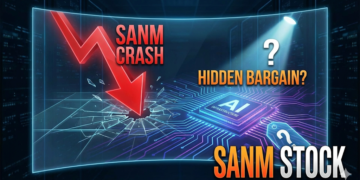Fitell Corporation (NASDAQ:FTEL) is a diversified wellness and technology company that has evolved from its origins as a fitness equipment retailer into an emerging player exploring blockchain-based treasury diversification. Headquartered in Australia, Fitell initially gained recognition through its subsidiary GD Wellness Pty Ltd, a provider of fitness equipment, gym accessories, and training gear for personal training studios and commercial fitness centers. The company’s early mission was to empower healthier lifestyles by supplying professional-grade wellness products at accessible prices, building a steady presence across the Australian fitness industry. However, facing the changing global economic environment and digital transformation trends, Fitell has begun repositioning itself toward innovative financial models and asset diversification to sustain long-term growth.
In recent years, Fitell Corporation has experienced a strategic shift as it transitions from being purely a traditional retailer into a corporate entity experimenting with digital asset integration. This transformation aims to align the company with the next wave of financial technology innovation while attempting to strengthen its treasury structure and hedge against inflationary risks. As part of this effort, Fitell has expanded into blockchain-based treasury assets, most notably those built within the Solana ecosystem. The Solana network, known for its high throughput, low transaction costs, and vibrant DeFi and Web3 ecosystem, has attracted growing interest from both institutional and public companies seeking to generate yield and diversify balance sheet holdings. For Fitell, this expansion marks a new phase in its corporate evolution—one that blends its established consumer wellness foundation with exposure to blockchain-powered financial infrastructure.
In October 2025, Fitell announced the addition of 216.8 million PUMP tokens worth approximately $1.5 million to its corporate treasury. PUMP is the native token of Pump.fun, a Solana-based launchpad that generates revenue through token issuance and transaction fees. This acquisition signaled Fitell’s growing participation in the Solana blockchain ecosystem, following earlier investments in Solana’s native cryptocurrency, SOL. By adding Solana-based assets to its balance sheet, Fitell aims to position itself among the growing number of public companies integrating digital assets into their treasury management strategy. The company stated that these holdings provide exposure to yield-bearing opportunities within the Solana network while establishing an early presence in one of the fastest-growing blockchain ecosystems.
Despite its shift toward blockchain asset diversification, Fitell’s core business remains rooted in health and wellness solutions. The company continues to operate its fitness retail division, supplying gyms, wellness centers, and private fitness enthusiasts with high-quality training and rehabilitation equipment. This segment remains integral to Fitell’s brand identity, anchoring the company in a physical product market that complements its digital expansion. Management views the combination of tangible consumer products and digital asset participation as part of a dual-growth approach—balancing operational business activities with innovative financial strategies that leverage blockchain’s potential for long-term value creation.
Fitell’s entrance into the blockchain space comes amid a broader trend of publicly listed companies adopting digital assets as part of their treasury strategy. From fintech firms to consumer goods companies, many organizations are exploring blockchain integration to improve liquidity, yield generation, and diversification. Fitell’s management has indicated that the company’s Solana-based treasury assets not only offer exposure to the blockchain’s performance but also open pathways to future collaborations within decentralized finance and tokenized business models. This signals a company-wide effort to stay at the forefront of innovation while exploring new revenue channels in the digital economy.
However, Fitell’s transformation is not without challenges. The company operates in a highly competitive retail environment with fluctuating consumer demand, and its crypto diversification introduces new volatility and regulatory complexities. Nevertheless, management remains confident that expanding into blockchain ecosystems will create long-term shareholder value. By combining its experience in the wellness industry with forward-looking financial strategies, Fitell aims to redefine its identity as a hybrid enterprise bridging traditional commerce with next-generation technology.
As of late 2025, Fitell’s strategy reflects the broader convergence between physical wellness, financial innovation, and blockchain adoption. Its dual focus on fitness equipment and digital asset treasury diversification makes it one of the few Nasdaq-listed microcap companies experimenting at this intersection. The company’s willingness to adapt to evolving market dynamics, along with its continued exploration of Solana’s expanding blockchain infrastructure, positions it as a case study in how traditional retail businesses are reimagining their role in the digital economy.
A Corporate Identity Crisis in Motion
Fitell’s original business model revolved around selling fitness and gym equipment through its subsidiary GD Wellness Pty Ltd. It served a niche market of personal training studios, commercial gyms, and wellness enthusiasts in Australia. However, following a disappointing financial trajectory—characterized by shrinking revenue, razor-thin margins, and persistent losses—Fitell began experimenting with new business models. Its pivot toward digital assets and blockchain investment has been branded as an effort to “diversify” and “modernize” its treasury strategy, but critics view it as a desperate attempt to stay relevant and attract market attention amid declining core operations.
This pivot follows a period of alarming financial instability. Fitell’s market capitalization remains below $10 million, its shares have collapsed more than 95% from peak levels, and it has already received a Nasdaq deficiency notice for failing to meet minimum bid requirements. After a 1-for-16 reverse stock split, the company temporarily regained compliance, but its shares continue to hover around penny-stock territory. For many investors, the repeated pattern of share consolidations, small-cap volatility, and speculative press releases suggests more of a survival tactic than a sustainable business reinvention.
The $1.5 Million PUMP Token Purchase: A Speculative Bet Disguised as Innovation
According to its October 2025 announcement, Fitell’s acquisition of 216.8 million PUMP tokens on the Solana blockchain is part of its broader “Solana-based treasury diversification strategy.” The company has positioned this move as a progressive step into the digital economy, following previous purchases of Solana’s native token, SOL, earlier this year. However, unlike traditional treasuries that prioritize liquidity, stability, and long-term asset protection, Fitell’s growing crypto exposure introduces extreme volatility to its balance sheet.
PUMP tokens, associated with the Pump.fun launchpad, are highly speculative digital assets used primarily for meme coin issuance and trading activity within Solana’s fast-moving ecosystem. While Solana has indeed become a hub for tokenized assets and decentralized finance applications, it remains a volatile and experimental space. For a small-cap company like Fitell—with limited operational cash flow and declining core business—allocating corporate funds to such assets raises concerns about governance, risk management, and financial prudence.
The broader crypto market is still recovering from its last bear cycle, and Solana-based tokens are particularly known for their sharp boom-and-bust patterns. A 50% decline in PUMP’s value would immediately wipe out $750,000 from Fitell’s treasury—an amount significant enough to materially affect its already fragile financial position.

CHECK THIS OUT: Gyrodyne (GYRO) Lands $28.74M Deal for 49 Acres in St. James, NAV Jumps 6% and NioCorp (NB)’s $1.14B Elk Creek Project Set to Transform U.S. Critical Minerals Supply.
The Solana Ecosystem: Opportunity Meets Extreme Risk
There’s no denying that Solana has become one of the fastest-growing blockchain networks in 2025, thanks to its high-speed transactions, low fees, and thriving developer ecosystem. Institutional interest has grown as major companies explore yield-bearing tokenized assets on the Solana network. However, most corporations entering this space are doing so through structured vehicles, managed funds, or diversified crypto portfolios—not by directly holding high-volatility tokens like PUMP.
Fitell’s aggressive exposure to speculative Solana tokens appears to be less about strategic diversification and more about chasing short-term publicity. By associating itself with buzzwords like “Web3,” “yield-bearing,” and “blockchain integration,” the company gains media visibility, but such moves do little to address its underlying business challenges. Investors should question whether Fitell has the expertise, infrastructure, and internal controls necessary to manage digital asset portfolios effectively, especially in the context of rapid price fluctuations and evolving regulatory frameworks.
Financial Red Flags and Dilution Concerns
Fitell’s financial filings paint a concerning picture. The company’s most recent statements show negative operating cash flow, thin liquidity, and consistent share dilution through repeated capital raises. Earlier this year, Fitell executed a registered direct offering of up to $10 million in shares and warrants to replenish working capital. These moves may provide short-term liquidity, but they come at the expense of shareholder value, driving dilution and eroding confidence.
The risk compounds when combined with Fitell’s new crypto holdings. If crypto prices fall sharply, Fitell could be forced to raise more capital—potentially issuing additional stock at depressed prices or taking on debt under unfavorable terms. This creates a vicious cycle: dilution leads to price drops, which lead to more dilution. For investors, this pattern represents one of the most common pitfalls among small-cap companies that pivot into crypto assets without a proven operational foundation.
The Broader Market Perception: Pump or Progress?
Market reaction to Fitell’s PUMP token purchase has been mixed. While some speculative traders have viewed the news as an opportunity for a short-term rally, long-term investors see it as further evidence of a company losing focus. In online forums, discussions around Fitell often compare it to other microcap stocks that have attempted to pivot into blockchain as a last resort to stay listed. These comparisons raise legitimate questions about credibility and sustainability.
Moreover, regulatory scrutiny around public companies using shareholder capital to purchase speculative crypto assets is intensifying. If Fitell fails to provide transparent disclosures about its token management practices, valuation methodology, or risk exposure, it could face inquiries from regulators or exchanges. For a company already operating at the edge of compliance, this adds another layer of potential downside.
The Bigger Picture: A Classic Case of Overreach
Fitell’s transformation from fitness equipment retailer to blockchain treasury operator highlights the dangers of chasing trends without strategic alignment. While diversification can be a valid corporate strategy, Fitell’s pivot appears reactionary—motivated by short-term market narratives rather than long-term planning. By adding 216.8 million PUMP tokens worth $1.5 million to its balance sheet, the company is effectively betting its treasury on one of the most volatile segments of the digital asset space.
This gamble may deliver short-lived headline excitement, but the long-term risks are significant. The company’s core business remains underdeveloped, profitability is nonexistent, and its financial cushion is thin. Unless Fitell can prove it has the expertise and governance infrastructure to manage crypto exposure responsibly, its treasury diversification strategy may end up being another chapter in a long line of failed corporate pivots.
Investor Outlook: High Risk, Low Conviction
The bearish thesis for Fitell Corp rests on one overarching reality—this is a company searching for identity in volatile markets. Its expansion into Solana-based assets may sound innovative, but it exposes shareholders to unnecessary risk without addressing fundamental weaknesses in its operating business. With low liquidity, heavy dilution, regulatory uncertainty, and speculative asset exposure, Fitell’s long-term outlook remains precarious.
Unless management can deliver consistent revenue growth, strengthen its balance sheet, and provide transparency on how digital assets are safeguarded and utilized, Fitell risks being perceived not as a blockchain innovator but as another microcap cautionary tale. For investors, the current setup leans heavily toward speculation, not sustainable value creation.
READ ALSO: CEL-SCI (CVM) Stock Could Explode After Saudi Breakthrough Deal and Ondas Holdings (ONDS) Lands $2.7M Defense Order.






